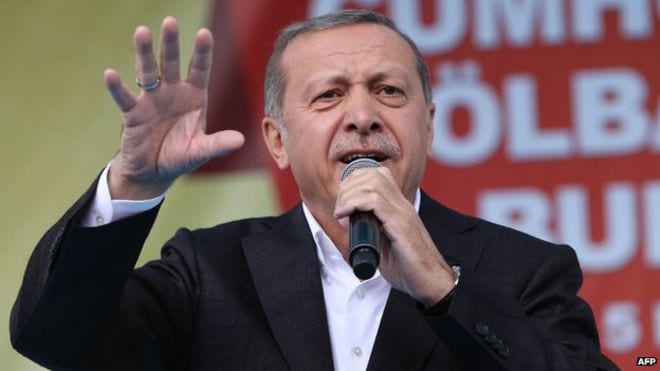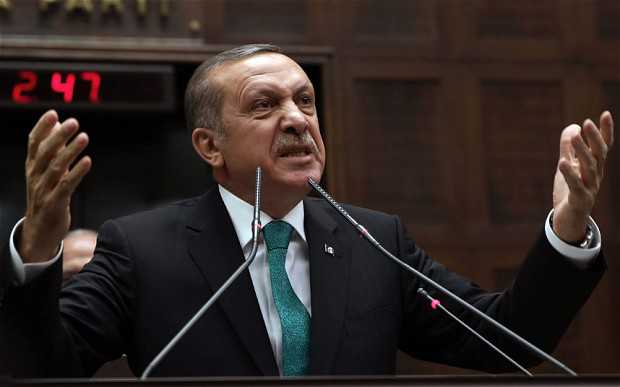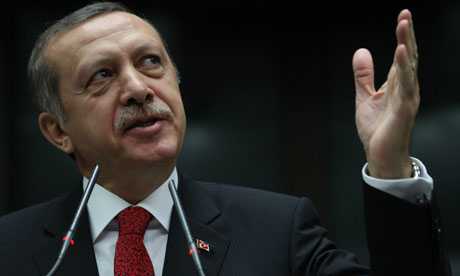From: BENJAMIN YAFET [mailto:[email protected]]
Open Letter to the Turkish Prime Minister Erdogan
“Dear Prime Minister Erdogan”
by David A. Harris
Executive Director, American Jewish Committee
February 1, 2009
Dear Prime Minister Erdogan,
I write as a friend of Turkey.
These days, though, I’m finding it harder to feel well-disposed. I’ve been stunned by things I’ve heard, seen, and read in recent weeks. The outburst of animosity for Israel and the anxiety awakened in the Turkish Jewish community make me wonder what’s going on and what the future holds.
If this only emanated from the “street” or from an extremist fringe, it would be worrisome enough. But it goes deeper – and higher. It starts at the very top. Yours has been the loudest voice, and you have used it to attack Israel in a manner that is not only vicious, but also disconnected from the facts.
Let me step back for a moment.
I have long admired Turkey. Like all countries, it’s not perfect, but there is much to appreciate.
As an American, I have valued Turkey’s strategic partnership with the U.S. and the close ties that have linked our two countries.
As a Jew, I have always remembered the Ottoman Empire’s warm welcome to Jews fleeing the Spanish Inquisition and the rich history of the Jewish presence in Turkey.
As a democrat, I have appreciated Turkey’s commitment to many values I cherish, including its participation with the Allied nations in the Korean War and its front-line role in NATO.
As a friend of Israel, I have witnessed the strengthening of bilateral links between Ankara and Jerusalem over the years, serving the vital interests of both nations, as many Turks and Israelis have learned to appreciate.
As a peace-seeker, I have been grateful for the role of Turkish peacekeeping forces, including in southern Lebanon, not to mention the facilitation of indirect talks between Israel and Syria.
In that spirit, I have acted on the assumption that friends help friends.
When Ankara has needed assistance in Washington, or even in European capitals, Turkish officials have often turned to American Jewish groups, ours among them. Whenever we could, as you know, we have been there to help.
When Turkey was struck by a major earthquake in 1999, we were there to build a school in the devastated region of Adapazari as a gesture of solidarity and friendship.
And when Turks in Germany were targeted by hate crimes, we spoke up. Indeed, in 1993, we traveled from New York solely to attend the funeral service at the Cologne mosque after an arson attack killed five Turkish women in nearby Solingen.
I don’t say these things to pat ourselves on the back, but to underscore our deep commitment to the relationship – in many ways, over many years.
Which brings us to the present.
Mr. Prime Minister, you have described Israeli policy in Gaza as a “massacre” and a “crime against humanity” that would bring about Israel’s “self-destruction” through divine punishment. These words are inflammatory, and they are wrong.
You seem to believe that Israel had other ways to deal with the relentless barrage of missiles and mortars fired at its civilians, even though months of restraint accomplished nothing.
You contend that Hamas is a reasonable negotiating partner. You even invited its leaders to Ankara, though it had not met the Quartet’s demands to recognize Israel, renounce violence, and abide by previous agreements. It still has not done so, and it still seeks Israel’s destruction with weapons imported from your neighbor, Iran.
You have accused Israel of deliberately seeking to kill civilians. In reality, as British Colonel Richard Kemp told the BBC, “I don’t think there has ever been a time in the history of warfare when any army has made more efforts to reduce civilian casualties. … Hamas has been trained extensively by Iran and by Hezbollah to use the civilian population in Gaza as a human shield.”
Even if you disagreed, you might have been respectful of such public criticism of Hamas, whether from Col. Kemp, EU official Louis Michel, Egyptian and Saudi leaders, or, in more hushed tones, some Gaza residents themselves. Instead, you accused “Jewish-backed media” of spreading falsehoods.
Mr. Prime Minister, Israel yearns for a secure and lasting peace. No one has more fully embodied that hunger for peace, or worked more tirelessly to achieve a new start for the Middle East, than Shimon Peres – Israel’s president, a Nobel Peace Prize winner, and your fellow panelist at Davos last week.
Yet, in your remarks, you essentially called him a child-killer. And, inexplicably, you quoted an obscure ex-Israeli who has turned into a rabid anti-Semite.
And then you left, claiming that the moderator had been unfair. We hope the conciliatory phone call between you and President Peres helped to repair the breach, but, make no mistake, damage has been done. By storming off the stage, you not only insulted him, but you harmed the image of Turkey. Maybe you gained popularity in the Turkish street, where anger against Israel and Jews has been stoked in recent weeks, but you did your country no service by your unstatesmanlike behavior.
Mr. Prime Minister, I wonder what Turkey would do if its population were targeted, day after day, by merciless enemies determined to wreak havoc, terrorize, and intimidate.
But wait. We know exactly how Turkey would act if it saw its national interests endangered.
When Turkey feared union between Greece and Cyprus, it rushed troops to the northern part of the island in 1974. A new government was declared. The UN Security Council later “deplore[d] the declaration of the Turkish Cypriot authorities of the purported succession.” Only Turkey recognized the new state. And over the years, the population of the Turkish part of the island markedly increased. Where did the growth come from? Observers insisted that it was a policy of settlement from Turkey.
Now, however, you assert that Israel should not be “allowed to enter through the gates of the UN” because it has defied the Security Council.
Turkey knows something about terrorism. The PKK has targeted your country for years, initially seeking an independent Kurdish state that included part of Turkey. Now it claims to seek greater autonomy for the millions of Kurds living in Turkey. Even as the PKK has apparently lowered its demands, has Turkey pursued talks with that murderous group?
Absolutely not.
Indeed, I recall a rather blunt threat from Ankara to neighboring Syria in the late 1990s: If the PKK continued to receive protection there, the Turkish army would cross the border and take matters into its own hands. Luckily for Turkey, Syria was smarter than Hamas. It got the message. I also remember last year’s incursion of Turkish forces into northern Iraq to stem PKK attacks from there.
But now, you demand that we “redefine terror and terrorism in the Middle East.”
And wasn’t it Turkey, objecting to Armenian policy toward Azerbaijan, that chose to close its border with landlocked Armenia from 1993 to today? Yet you now accuse Israel of creating “an open-air prison” by sealing its own frontier with a hostile territory.
Please understand me. I am not – I repeat, not – seeking here to pass judgment on Turkey’s actions. Rather, I am simply recounting them to show what happens when the shoe is on the other foot.
It’s so easy to tell another country what it should or shouldn’t do in the face of threats, especially when one’s own country is ten times more populous and 38 times larger. But ultimately, Israel, like its friend Turkey, must make tough choices to protect its citizens.
Mr. Prime Minister, only you know how far you want to take your belligerent posture. It has already resulted in damage to your country’s reputation in the United States, concern for the well-being of the Turkish Jewish community, and, no doubt, joy in Iran and Hamas’ radical circles.
The Turkey I know and admire would recoil from partners like Iran and Hamas. Their central beliefs are antithetical to everything that modern, democratic Turkey ought to stand for.
And so, even as I worry, wonder, and despair, I’ll be watching, waiting, and, yes, hoping.





